
Opinions
20:19, 15-Dec-2018
Opinion: Brexit needs less argument, more compromise
Updated
19:43, 18-Dec-2018
CGTN's Xu Sicong
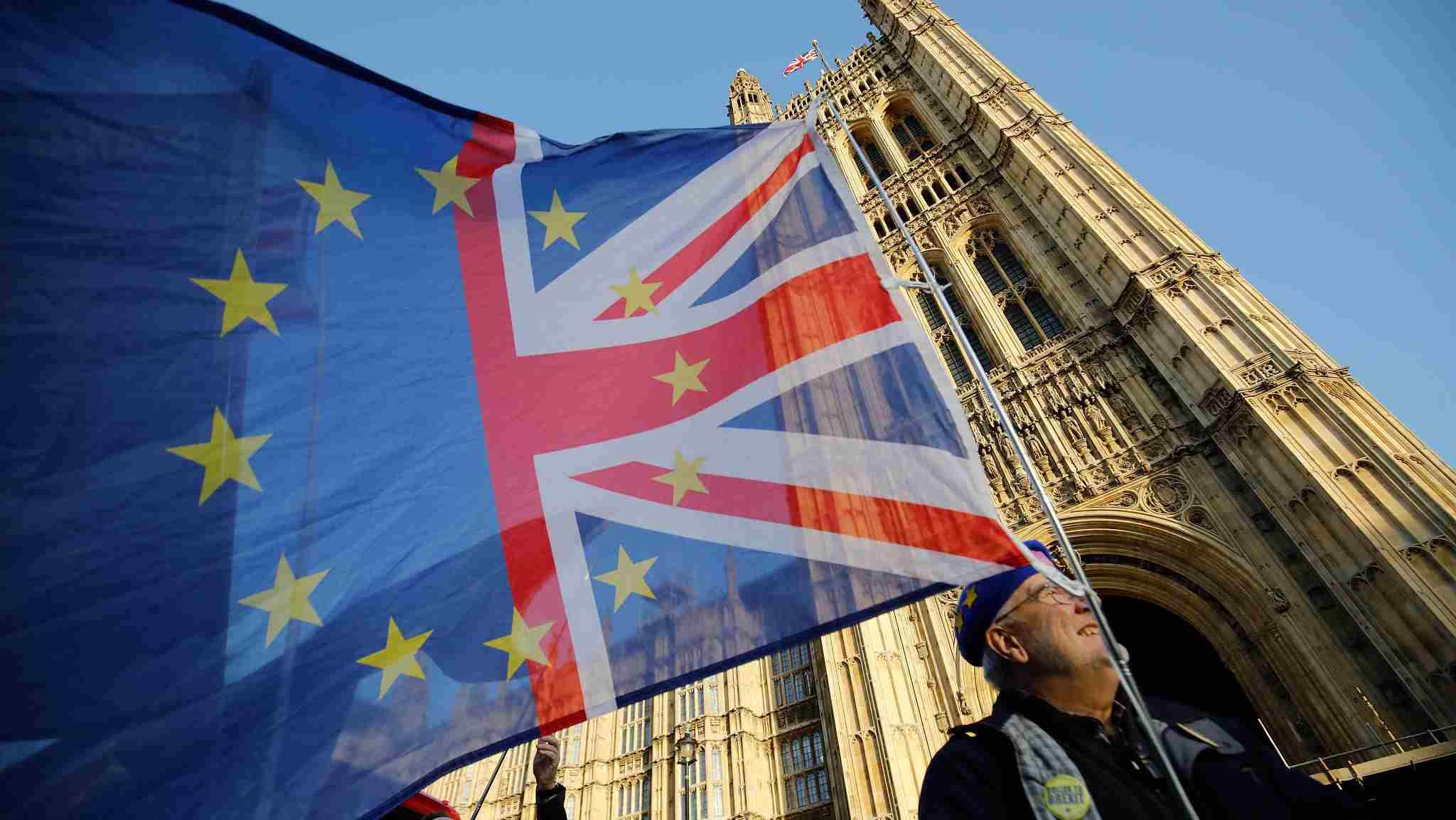
Editor's note: Xu Sicong is an opinion editor with CGTN Digital. The article reflects the author's opinion, and not necessarily the views of CGTN.
On December 14, Secretary of State for Work and Pensions of the United Kingdom Amber Rudd wrote on the Daily Mail, warning against the danger of “Brexit getting stuck”. She then put the solution in the article, urging the country to unite behind Theresa May and calling on politicians to “argue a little less and compromise a little more.”
Indeed, Brexit has been in a gridlock for too long. The mood surrounding the topic has been gloomy. With a plethora of voices forcefully arguing for different visions of the country's future and not willing to budge an inch, Britain is now at a loss as to how to proceed with this.
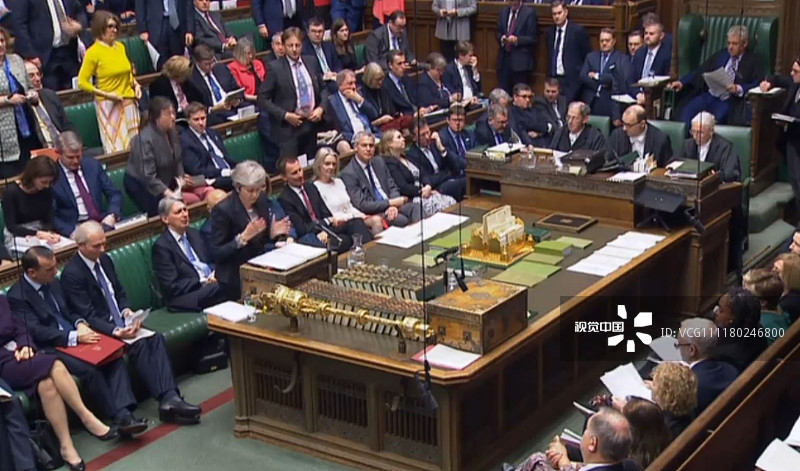
Theresa May speaks during Prime Minister's Questions in the House of Commons, London, December 5, 2018. /VCG Photo
Theresa May speaks during Prime Minister's Questions in the House of Commons, London, December 5, 2018. /VCG Photo
When the former British Prime Minister David Cameron announced a referendum on the EU membership in February 2016, he, unknowingly, took the country on a treacherous road. Four months later, the referendum result hardly settled any disagreements between Remainers and Brexiters; if anything, the debate only intensified.
Some said that it hurt them to see the country heading in a direction that was terribly wrong, of which, they also feared there would be no turning back.
Then there followed a short period of time when fatigue seemed to settle in and acceptance with the result had slightly grown. However, that was met with increased intensity in the debate later over which version of Brexit the UK desires and thus became a thorny issue that saw Brexiters vehemently clash over.
As negotiations between the UK and the EU unfolded, people have gradually come to grasp the complexity of this historic divorce. It turned out that “detangling” or “redefining” this convoluted relationship is much more complex than the binary choice Britain made earlier.
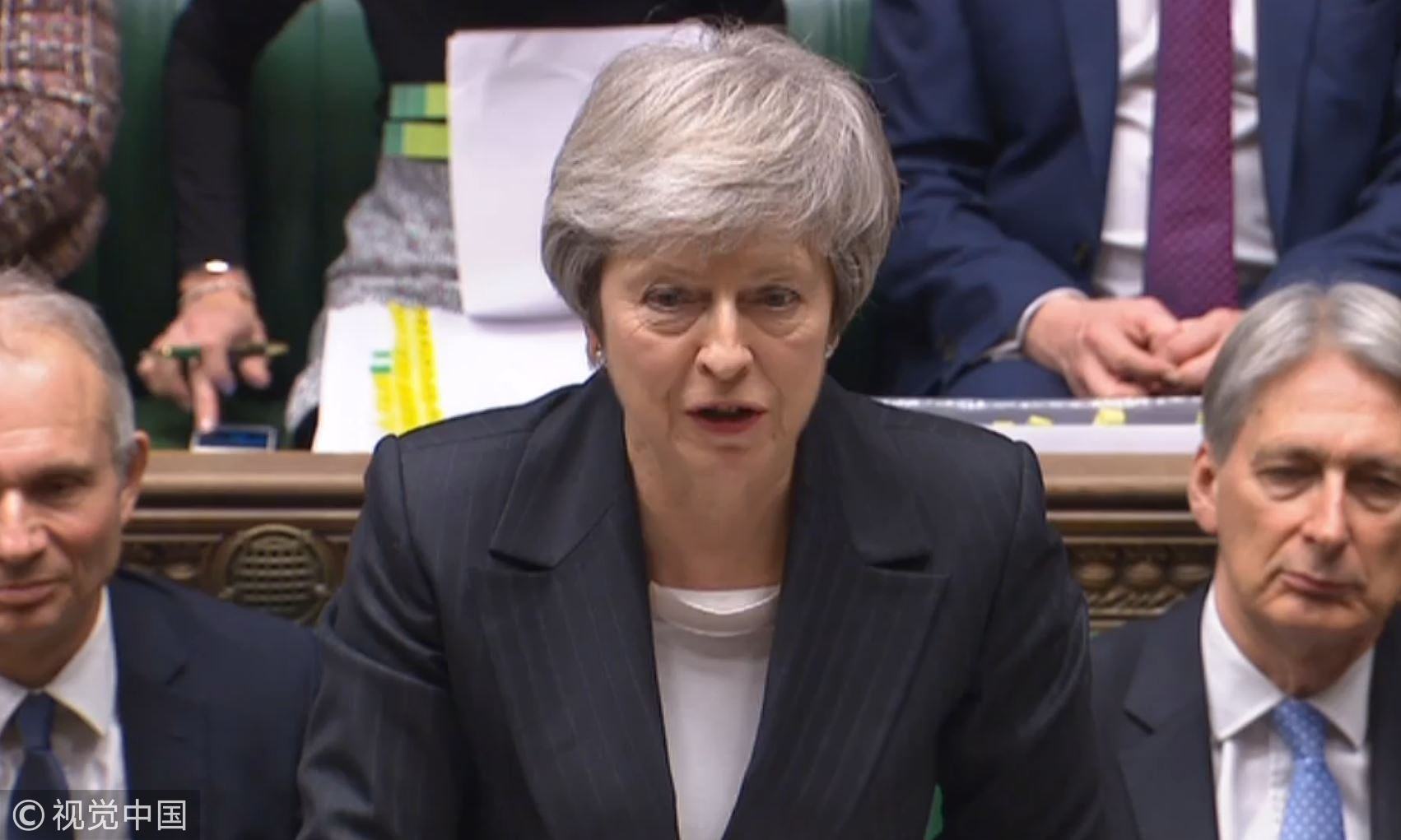
Theresa May speaks during Prime Minister's Questions in the House of Commons, London on December 5, 2018. /VCG Photo
Theresa May speaks during Prime Minister's Questions in the House of Commons, London on December 5, 2018. /VCG Photo
Arguing when people previously cast their votes in June 2016, they did not comprehend what “leave” in reality entails, Remain campaigners launched a People's Vote this April where people took to the streets expressing their frustration with the current negotiations and calling for a second referendum. Till now, the idea of a second vote still has considerable support.
However, for observers outside the country, a second referendum is simply a convenient excuse to get what remainers did not get in the first place. And if the 2016 referendum serves any lesson to British politicians, they should realize referendums only deepen divisions and open new routes for bitter arguments.
Referendums may be a great way to give people chances to express their voices. However, hoping to meet the needs of every individual in a society is simply unrealistic and impractical.
Brexit is a multi-dimensional project, fusing together the issues of identity, sovereignty, the country's global standing, and its economic interests.
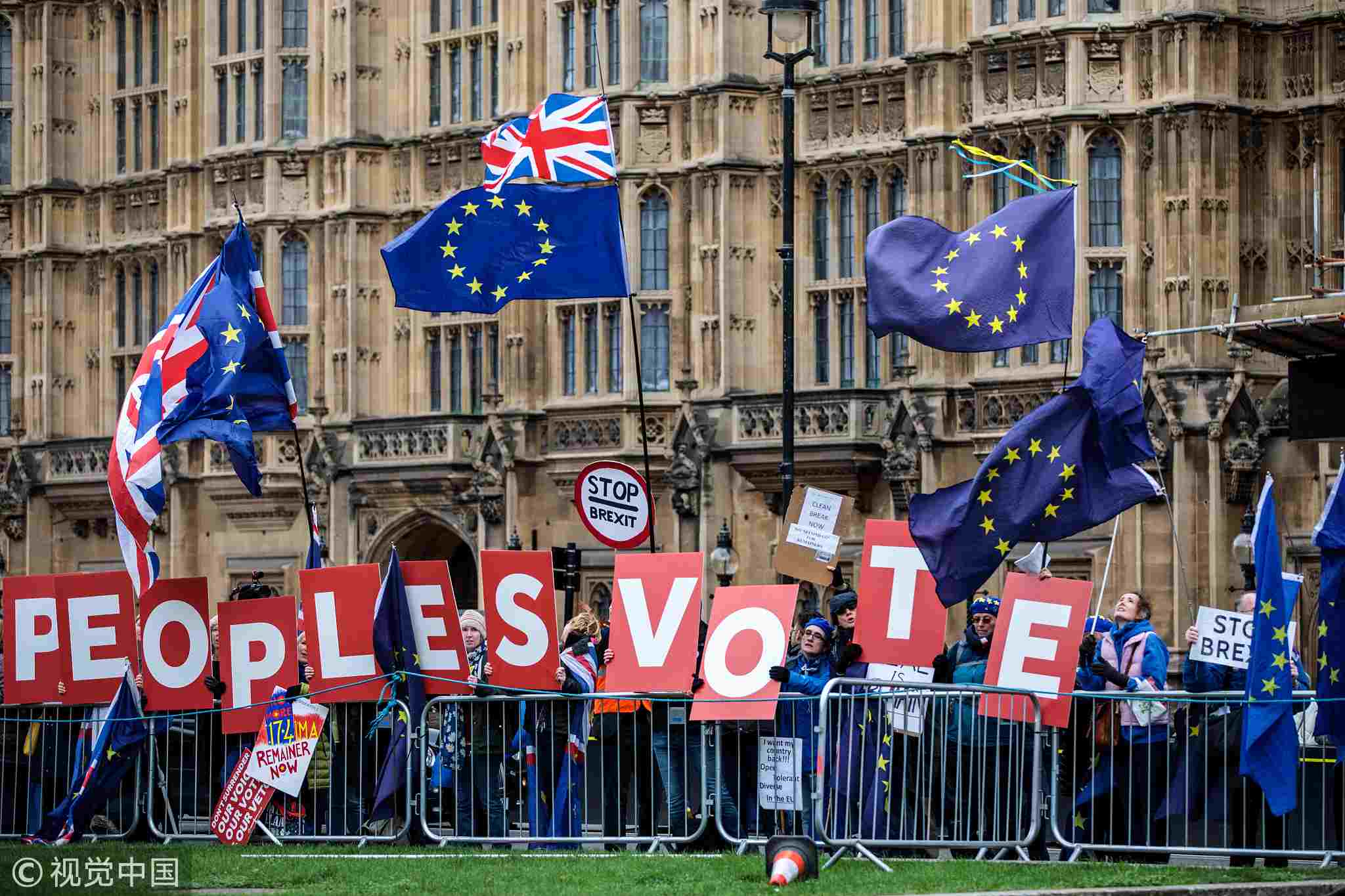
Pro-EU remainders protest opposite the Houses of Parliament in London, UK on December 10, 2018. /VCG Photo
Pro-EU remainders protest opposite the Houses of Parliament in London, UK on December 10, 2018. /VCG Photo
The ongoing Brexit process has seen people up and down the country, with different economic backgrounds, cultural beliefs and ideologies, deeply split over how they envisaged the country's future and how that particular version would advance their own interests.
Businesses are more concerned with the no-deal scenario; working classes in northern England mostly see free movement of people as a big threat; certain politicians would believe staying in the EU is the best way for the country to maintain its global standing and advance liberal values. Firm in their own beliefs, very few are willing to making compromises.
But if everyone keeps digging in their own trenches and maintaining that their red lines should never be crossed, the country is certain to remain in the current deadlock for even longer.
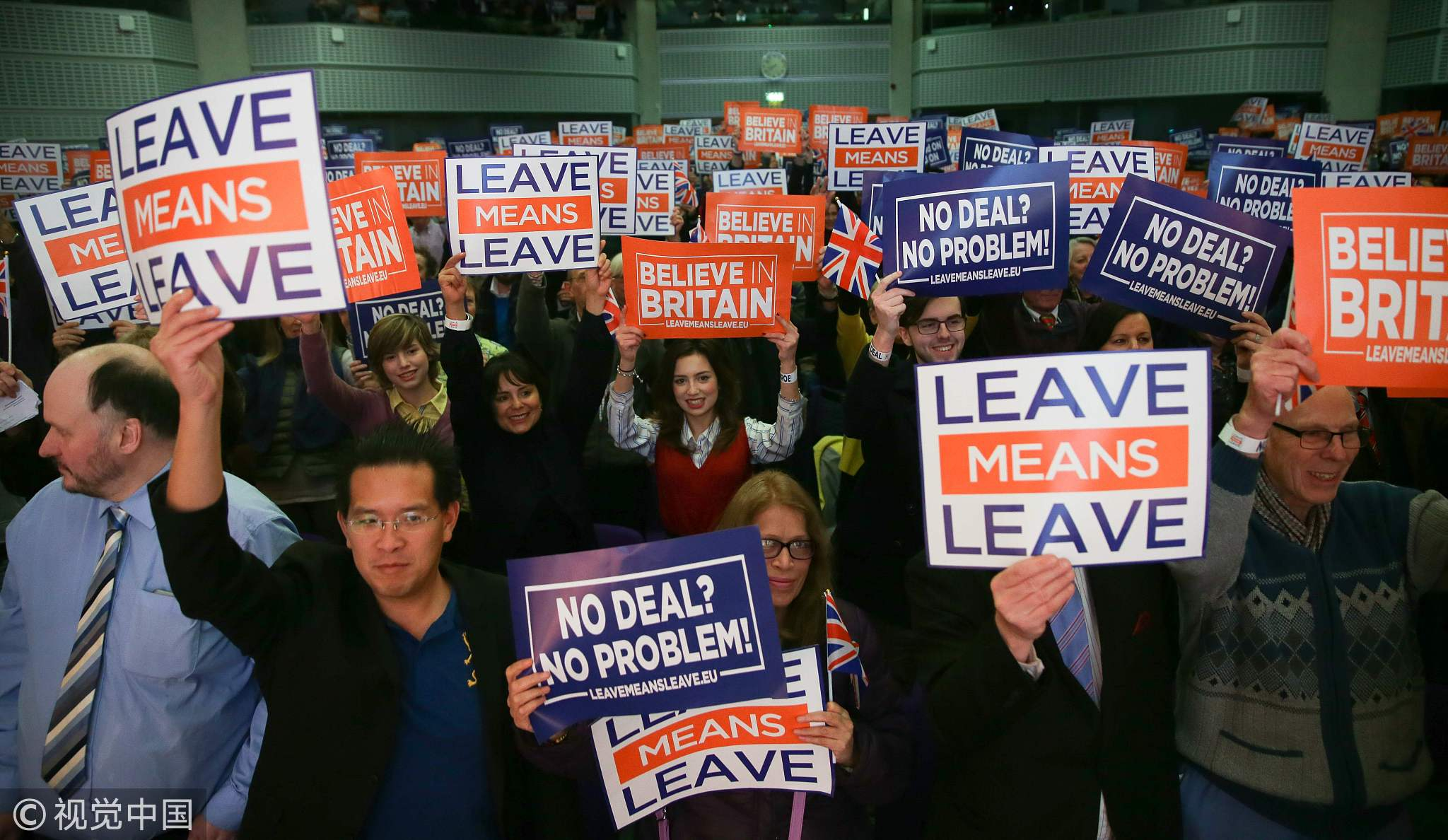
Pro-Brexit protesters demonstrate in London, UK on December 14, 2018. /VCG Photo
Pro-Brexit protesters demonstrate in London, UK on December 14, 2018. /VCG Photo
The actual possibility may be that a great country as the UK is, the fifth biggest economy in the world, with its strong industrial base and envious technological capabilities, can prosper either in or outside the EU. The relationship with the union would not be the determinant of the country's future, albeit there is no denying that it is a major factor.
In retrospect, the first referendum may have been a disastrous decision, in some people's views. However, the result is out and has to be delivered on. Treading on this path, the country should indeed show a bit more understanding and lend the government more support, so as to enable swifter action.
Even though she survived the no-confidence vote on Wednesday, Theresa May's future still does not look secure. After her trip to the EU, the possibility of renegotiating the withdrawal agreement she reached with the union last month was rejected .
However, the EU also offered some assurances on the backstop, one of the biggest sticking points of Brexit, promising they would work with the UK with best endeavors to avoid it being triggered. This is a good sign.
Mrs. Amber has a point that the country right now needs action rather than indecisiveness and division.
(If you want to contribute and have specific expertise, please contact us at opinions@cgtn.com.)

SITEMAP
Copyright © 2018 CGTN. Beijing ICP prepared NO.16065310-3
Copyright © 2018 CGTN. Beijing ICP prepared NO.16065310-3